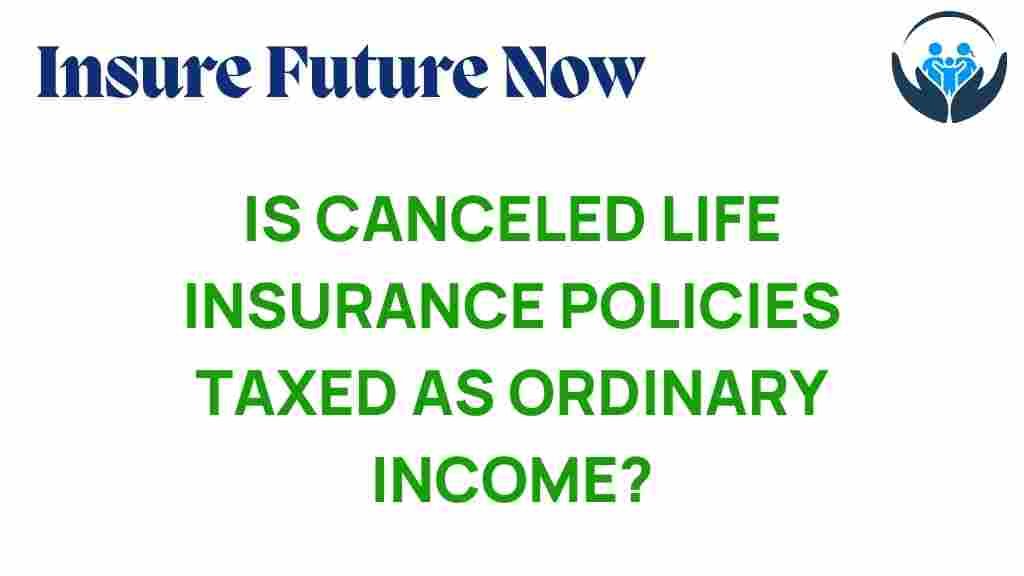Are Canceled Life Insurance Policies Taxed as Ordinary Income?
When it comes to managing your financial future, understanding the implications of canceled life insurance policies is crucial. Many policyholders wonder whether the proceeds from a canceled life insurance policy are taxed as ordinary income. This article will explore the tax implications of canceled life insurance policies, relying on IRS guidelines and providing a comprehensive understanding of how these situations can affect your financial planning.
Understanding Canceled Life Insurance Policies
A canceled life insurance policy is one that has been terminated before the insured individual passes away. This could happen for various reasons, including:
- Failure to pay premiums
- Choosing to surrender the policy for its cash value
- Voluntary cancellation by the policyholder
When a life insurance policy is canceled, it is essential to understand the financial and tax implications that follow. The IRS has specific rules regarding how the money received from canceled life insurance policies is treated for tax purposes.
Tax Implications of Canceled Life Insurance Policies
According to IRS guidelines, the tax liability associated with a canceled life insurance policy largely depends on the amount received compared to the total premiums paid. Here are the fundamental points to consider:
- If the total cash value received upon cancellation is less than the total premiums paid, there is typically no tax liability.
- If the cash value received exceeds the total premiums paid, the excess amount is considered taxable and may be treated as ordinary income.
It’s crucial to maintain accurate records of your premium payments and any withdrawals or loans taken against the policy to determine your tax liability correctly.
Step-by-Step Process for Evaluating Tax Liability
To understand if you will face a tax liability upon the cancellation of your life insurance policy, follow these steps:
- Review Your Policy: Check the policy documents to find out the total premiums you have paid over the life of the policy.
- Determine the Cash Value: Find out the cash value offered by the insurance company upon cancellation. This is the amount you will receive.
- Calculate the Difference: Subtract the total premiums paid from the cash value received.
- If the result is positive, you may owe taxes on the difference, which is considered ordinary income.
- If the result is zero or negative, you generally won’t owe taxes.
- Consult IRS Guidelines: Review the IRS publications related to life insurance and taxation to ensure you understand your obligations.
- Seek Professional Advice: Consider consulting a tax professional or financial advisor for personalized guidance based on your situation.
Financial Planning Considerations
Understanding the tax implications of canceled life insurance is vital for effective financial planning. Here are a few considerations:
- Assess Your Life Insurance Needs: Regularly review your life insurance coverage. Changes in your financial situation or family dynamics may require adjustments.
- Explore Alternatives: If you’re considering canceling your policy, explore alternatives such as converting it to a different type of coverage or taking a loan against the cash value instead.
- Be Aware of Fees: Some policies may have surrender charges that can affect the cash value you receive; factor this into your calculations.
- Keep Records Updated: Maintain thorough records of all transactions and communications with your insurance provider.
Troubleshooting Common Issues
Policyholders may face various challenges when dealing with canceled life insurance policies. Here are some common issues and solutions:
- Lost Policy Documents: If you cannot find your policy documents, contact your insurance company for a copy. They can provide you with the necessary information.
- Discrepancies in Cash Value: If you believe the cash value offered is incorrect, request a detailed statement from your insurer that outlines how the cash value was determined.
- Tax Questions: If you have specific questions regarding how to report your canceled policy on your tax return, consider reaching out to a tax professional or referencing the IRS Publication 554 for guidance.
Conclusion
In conclusion, canceled life insurance policies can have significant tax implications, particularly concerning whether the proceeds are taxed as ordinary income. By understanding the guidelines set forth by the IRS and keeping meticulous records, you can effectively manage your tax liability. Financial planning is integral to ensuring that you make informed decisions regarding your life insurance coverage. If you ever find yourself in doubt, do not hesitate to seek professional advice to navigate the complexities of your financial landscape. For more information on life insurance and financial planning, visit this resource.
Ultimately, ensuring that you are well-informed about the tax implications of canceled life insurance policies will help you make sound financial decisions and secure your financial future.
This article is in the category Claims and created by InsureFutureNow Team
